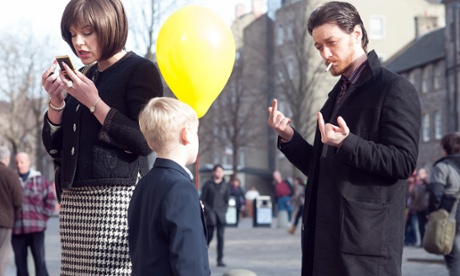
Forget James McAvoy and those redemptive to-camera monologues. The literary version of Irvine Welsh’s DS Bruce Robertson is so slimy and poisonous even Attenborough (David, not Richard) wouldn’t handle him. A middle-aged caveman sustained by Kit-Kats and prejudice, with galloping eczema around his nether regions and trousers so shiny you could do your makeup in them, “Robbo” is an old-school copper bent on promotion. And, boy, don’t we just love him.
Officers today still tell Irvine Welsh: “We all know a Robbo,” when he signs their copies of Filth. That means in every station, there’s a wiffy psychopath who wants to turn your noise complaint into a sex-crime confession. This is just one of the tricks the dirty DS pulls while pounding the streets of Edinburgh in 1997.
Labour have failed to repeal the union laws, allowing him to gobble up all the flat-rate overtime he wants, and when he’s not stealing old ladies’ ornaments or goading Scousers over Hillsborough, his focus is sex – particularly if it involves the degrading of women. Careful to select targets whose self-esteem is so low it blinds them to the rash in his Ys, Robbo’s pickup routine seems straight out of Neil Strauss’ The Game: “Give a new bird the very best possible time, and then she knows you have the capacity to do that again – and is always looking inwards blaming herself for not being able to reactivate that passion in you.”
What makes Robbo so compelling is that he’s bristling with life compared to the stereotypes he’s divided his beat into: schemies, spastics, muppets, Hibs fans. While there’s no denying his vicious humour (particularly the botched acid raid where the sniffer dog eats the evidence, and hurls itself out of the window), under his jokey exterior there’s a conflict raging. This is a trait Welsh explored with previous lowlifes Begbie and Lexo (who both make cameos here) and the preening Larry Wylie.
But as nasty at these headbangers are, they lack the relish with which the copper engineers others’ destruction. Robbo faces only two serious opponents: Amanda Drummond, a colleague whose diligence and cardigans obviously peg her as a lesbian, and the talking tapeworm he contracts through eating frozen pies. This character truly has Robbo’s number, breaking into his narrative with reminders of his pit-village past: “You are repulsed and proud. While other children fantasised about killing in wars, you wanted to be in the position to send others to their deaths… In your head you practise speeches condemning the enemy.”
It only appears for a single shot in the film, but in the book the tapeworm gnaws through Robbo’s guts, scenting the compassion that’s not as dead as its host thinks. It reminds him that he was once an ostracised kid whose reaction to the 1984 miners’ strike was to defect to the winning side; someone whose power cravings mirror the worm’s growth, and whose view of the parasite as the enemy within echoes the fate of his own class at the hands of Thatcher.
If a bent copper arguing with his tapeworm wasn’t a grisly enough device for you, Welsh works in a further darkness that the film wouldn’t dare touch. There’s a reason Robbo’s wife ran out on him, a reason his daughter sounds so scared on the phone. Welsh may have been horribly prescient when he made a warped hospital patron a homage to Jimmy Savile in 1996’s Ecstasy, but it’s DS Bruce Robertson who is his darkest character. He’s also, disturbingly, his most readable.

